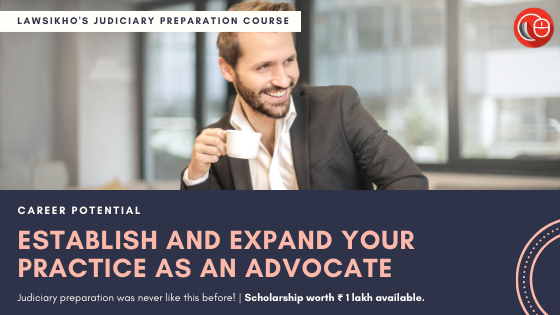This article is written by Ramanuj Mukherjee.
Ok, so you have given your interview. You have done your best. Now you are waiting to hear back from them.
You must be wondering at this point, did it go well? Will I get this job?
I remember my Day 0 in college. I was studying at NUJS, Kolkata.
It was the first day of 5th year.
4 law firms came to campus for the first pick of the best in our batch, and I applied to 3. AMSS, Luthra, Trilegal. I left out Khaitan & Co because I did not think it was as good (actually I was the ignorant one, KCo grew massively in the following years and was a really good option even at that point).
My interview with Trilegal was short and went really well. I had something interesting to say to the questions they asked me. I thought I did well. I knew that I would make it.
Then I had the AMSS interview. Legendary banking partner at AMSS, Mr. Bhojani took my interview. Mr. Bhojani seemed to like me but then I didn’t like the interruptions coming from the HR panelist who appeared to be sitting there to assist Mr. Bhojani. I answered something mundane to “where do you see yourself after 5 years?” and the HR guy wasn’t buying it.
He asked me the same question again. I probably rolled my eyes and said “do you want me to repeat my answer?”
And that was it.
I knew even then that this interview wasn’t going anywhere.
My Luthra interview was harder to decipher.
They asked me some things from the CV, especially about the independent work I had done with some startups. They asked some tricky conceptual questions – what if your client asked xyz based on what I told them about my past work? Then they left me to think about it and took a toilet break. When they came back, I told them what I thought of, but I wasn’t sure if I was going in the right direction. They told me the answer, which was close and appreciated my thought process.
At that point, I was a little unsure if I would make it, but I was hopeful, too. Will they reject me because I didn’t get the answer outright correct?
I made it to Trilegal and Luthra, as expected. AMSS was not to be.
My hunch was right.
I have not appeared in job interviews since, but have taken a few hundred job interviews in the last 10 years. As the CEO, I have usually played the role of the chief recruiter in the company until recently. Now I have other co-founders hiring as frequently as I do. I have also helped countless students from LawSikho prepare for their job interviews.
I still remember the tension I felt waiting for the results of my interviews and the feeling of numbness when I finally heard it.
Something reminded me of that day recently.
I recently got a call from a student who was waiting for interview results, told me how it all went, and asked, Ramanuj, do you think I will make it?
I asked him a few questions to decipher if he made it.
And predicted he would get the job.
And it was true, he did, as it turned out eventually!
So I thought of writing this article. Why not share these questions with you guys?
Here are 10 signs that you should read to know if you did well in your interview and have a really good chance of making it or if you bombed it.

Did they say anything about whether they will hire you, or if they are interviewing more people
I can assure you that recruiters are really relieved if they come across even one suitable candidate. Sometimes, we have to interview 10-15 to get even one person we like, and then we are anxious whether we will be able to actually get them to join. Maybe there will be a budget issue, or maybe they have to serve a long notice period. Or maybe they will choose another organization over ours.
So we may end up asking some telltale questions.
Or outright asking if they will like to join us, eager to seal the deal.
Some very good questions to be asked:
Are you interviewing at more places?
What is the earliest day when you can join?
We can’t wait for that long. Is there any chance you can join earlier?
How long is your notice period?
How will you commute to the office?
These questions are good signs.
What is your salary expectation?
That’s too high, this is our budget.
Many times, the interviewer will tell you that they are interested in hiring you on the spot. Best is if they are negotiating the salary or benefits with you then and there. They might also discuss joining formalities. These signs are very good and suggest that you are probably getting hired.
However, remember that nothing is a done deal until you get your offer letter in your hands. Someone may really like you and still change their mind next morning and settle for another candidate.
Did they say “we will get back to you IF you are selected”?
Did they say “we are interviewing other people as well so…”
That is not the best sign. However, sometimes it may not mean much.
Were you able to connect well with them as a human being
Did you like the interviewer? If you liked them, chances are that they liked you too.
Were you charming? Did you have a good time interviewing? Did you enjoy answering the questions you were asked?
Here is one catch here. It is possible that all this happened because you charmed the interviewer and did really well. Or it could be that the interviewer was a charming personality and made sure you had a great time and you don’t really deserve the credit for the good vibes that you experienced.
It is not necessary to be a smooth talker, cracking jokes or saying something witty every 3 minutes. However, it counts if you were vulnerable, open, built a great rapport and made the other person comfortable during the interview.
Many young interviewees do not realize that they also have a duty to make sure that the other person has a good time and enjoys the process. They feel that they are at the mercy of the interviewer, the way they have experienced in a college viva perhaps.
You have to make that interview memorable if possible. How would you do it? Would you not extend your best personality? Please do not sit passively and wait for questions to be fired at you.
It is a conversation, make sure you have a great one.
Did you ask the right questions
Did you ask any questions from your side? You asking the right questions goes on to show that you know what the role is about. It is a very important part of the interview, although most people never ask any questions.
Asking irrelevant questions, or questions that you could google instead before the interview, does not look good though.
Recently, I was hiring in a sales role. One candidate asked me questions about how we generate leads, how do we know if quality of the leads are good, if we have any money back policy, what are the USPs of the product, how are we better from our competitors (he had googled them too), how many leads are given to a salesperson on a daily basis, and so on.
I really enjoyed that interview, because here was a person truly trying to understand the role and clearly he knows what goes into selling.
Another person I interviewed on the same day asked me “What does LawSikho do? What is its main business?”
OK then. What does this question tell me about the candidate? Either she is not serious about the interview or she is very lazy and does not do even basic preparation.
Guess who I hired.
If you asked the right questions, and the interviewer answered those enthusiastically, that is a very good sign. If he was not going to hire you, or unless he is seriously considering you, he will not give elaborate answers.
I notice that even senior resources sometimes come to an interview without preparation, and it is definitely not something that is appreciated. It just sends a very wrong signal.
Imagine you have already got the job and you have to now do a great job. What questions will you need to ask, after going through what is publicly available already?
Will you ask questions about targets? Will you ask questions about how performance is measured? Will you ask questions about what are the areas of challenge that the team is facing and struggling to overcome?
Your questions will influence the outcome of the interview a great deal, but depending on the answers you receive, you can gauge your chances a great deal.
What were the criteria they were checking you on? Did you fit the type they seem to have in mind
You need to figure this out, ideally before the interview, and in the worst case during the interview.
Your preparation for the interview should depend a great deal on what you think they are looking for in an ideal candidate.
What are the top 3 skills or traits they are looking at?
How will you convince them that you are the best as per those requirements?
And you can tell if your interview went well or not based on your assessment of what they were looking for, and whether you delivered on those points.
If they were looking for experience, were you able to highlight your relevant experience? Did they seem convinced or impressed with your answers?
On the other hand, let’s say they did not care about experience so much. Then even if you totally impressed them on the count of your past experience, it may not help so much.
At the cost of repetition, what are they hiring on, and do you tick the boxes? That should tell you if you have a good chance of getting hired.
Did at any point of the interview you were able to explain how you will be able to grow the business, prevent losses or solve the problems they faced in the past
Think of the interview as a pitching event. It is not for you to answer some questions and pass a test. It is a face to face meeting where you are asking the employer to invest in you. You should come with a plan and convince them that your plan will work and you are the right person to execute this plan.
Sometimes it is wiser to learn their plan that they already have and then give your suggestions on that. Then explaining why you are the right person to do it.
However, you need to sell them the idea that you can either help to grow the business or that you can cut some losses. More than anything else, you need to show them that you will take away some of their current headache. You need to show them how you are going to do it and why you will be successful.
If you have done this well in your interview, there are very high chances that you will get what you want.
But most people don’t do any of these things
You are right. But that is why these things are even more powerful as they are rarely done, and done only by the top performers.
The moment you start taking this kind of an approach to your job interview you will really stand out from the crowd.
But then if you are one of those people who have these fundamental things sorted out and if you prepare for job interviews accordingly, you probably know that your interviews always go very well and you have nothing to worry about.
You will excel.
On the other hand if you don’t know how to prepare like this for your interviews, try joining any of the premium courses from LawSikho. Our placement office will give you the kind of training you need to become a top performer like this and never worry about your interviews again.
Here are the courses in which you could enroll today and get started:
- If you are interested in corporate governance, you should check out the diploma in Companies Act, Corporate Governance and SEBI Regulations;
- If you want to get that in-house counsel job, go check out the diploma in Business Laws for In-House Counsels;
- If Industrial and Labour Laws interest you, go take a look at that diploma course;
- The Intellectual Property, Media and Entertainment Laws will be booming in the coming times, if you’re inclined towards that career, check out that diploma course;
- If you’re sure that your niche lies in M&A, Institutional Finance and Investment Laws (PE & VC transactions), go check out that course;
- The Cyber Law, Fintech Regulations and Technology Contracts is in dire need of good young talent if that is what ticks for you, go check out that course; and
- Every young lawyer should check out our diploma course in Advanced Contract Drafting, Negotiation and Dispute Resolution.
Check out our other executive courses which can be helpful:
- We have a certificate course in Advance Corporate Taxation;
- You can also check out this course for Insolvency and Bankruptcy Code;
- If Trademark, Licensing; Prosecution and Litigation interest you, we have a course for that;
- LawSikho also teaches Competition Law, Practice and Enforcement in a course;
- Technology Contracts will be essential to every business in the future, you can check out that certificate course; and
- Knowledge about Banking & Finance Practice: Contracts, Disputes & Recovery is essential for every BigLaw layer, you can check that out too.
LawSikho has created a telegram group for exchanging legal knowledge, referrals and various opportunities. You can click on this link and join:
 Serato DJ Crack 2025Serato DJ PRO Crack
Serato DJ Crack 2025Serato DJ PRO Crack










 Allow notifications
Allow notifications


